Apes Unit 1
1/64
There's no tags or description
Looks like no tags are added yet.
Name | Mastery | Learn | Test | Matching | Spaced |
|---|
No study sessions yet.
65 Terms
What would be the result of the removal of the fungal partner from this symbiotic relationship?
While lichens may appear to be members of a distinct species, they are actually formed by a symbiotic relationship between a fungus and an alga. The identification as a lichen comes from the interdependence of the two organisms. The alga flourish in a damp environment with a surplus of inorganic nutrients provided by the fungal partner, while the fungal partner is assisted by the photosynthetic products of the alga.
Due to the obligatory mutualistic nature of the relationship, the alga would not survive the change in environment.
Of all the water resources on Earth, what approximate percentage is saline?
97%
There are fewer top predators in a food chain than producers. The loss of usable chemical energy from one trophic level to the next demonstrates the
Second Law of Thermodynamics
According to the provided information about the African savannah, which statement accurately describes the feeding habits of mosquitoes?
mosquitoes
The driving force of the movement of water in the hydrologic cycle is
Solar energy
The nitrogen cycle is essential to living organisms primarily because nitrogen is a key component of which of the following groups of biological macromolecules?
Amino acids and nucleic acids
Of the following biomes, which MOST likely has leaf litter, maple and oak trees, understory shrubs, small mammals, songbirds, and white-tailed deer?
Temperate Deciduous Forest
What is the average amount of water used for irrigation, as identified by a specific percentage?
70%
What type of competition do the Hartebeest below illustrate?
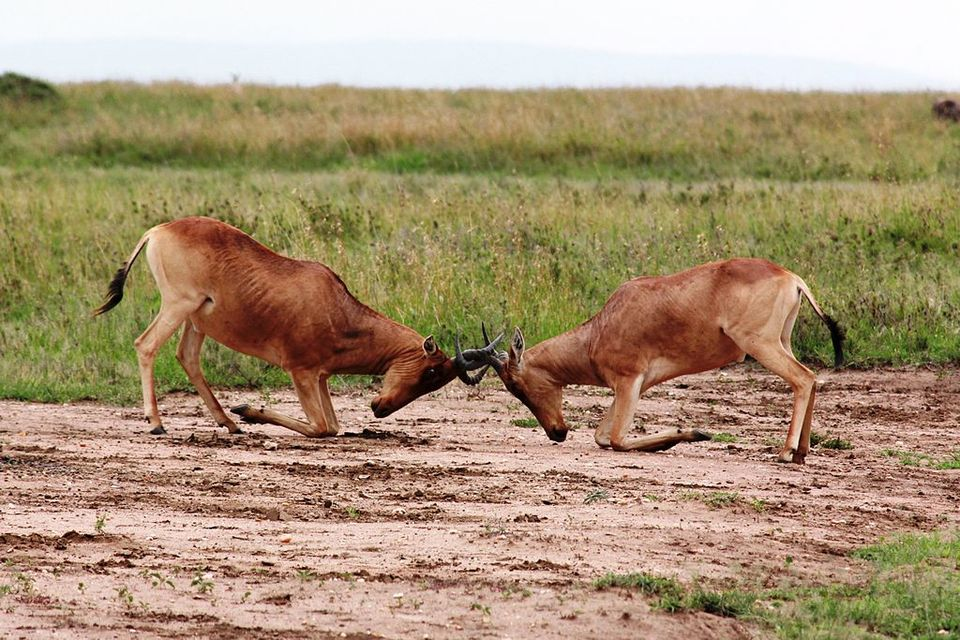
Intraspecific
Which of the following does NOT describe a possible role of a secondary consumer?
Herbivore
A farmer analyzes the quality of his soil and determines it is lower in nitrogen than he would prefer. Instead of using organic or synthetic fertilizer, what could he do to increase the levels of nitrogen?
Plant legumes like clover or alfalfa
Which of the following is TRUE about tertiary consumers compared to primary producers in a sunlight dependent ecosystem?
Less biomass, more biomagnification.
Sugar beets are among the most photosynthetically efficient plants in the world. The average photosynthetic efficiency of sugar beets is
6
The density of water is greatest at which of the following temperatures?
4°C
What is the BEST example of a temperate biome that is too dry for forests and too moist for deserts to occur?
Temperate Grasslands
Surface water would include all of the following except:
Aquifer
For the Chesapeake Bay water bird food web provided, which of the following organisms would be classified as an omnivore?
Wading Birds
Which of the following BEST describes the relationship between mistletoe and the tree?
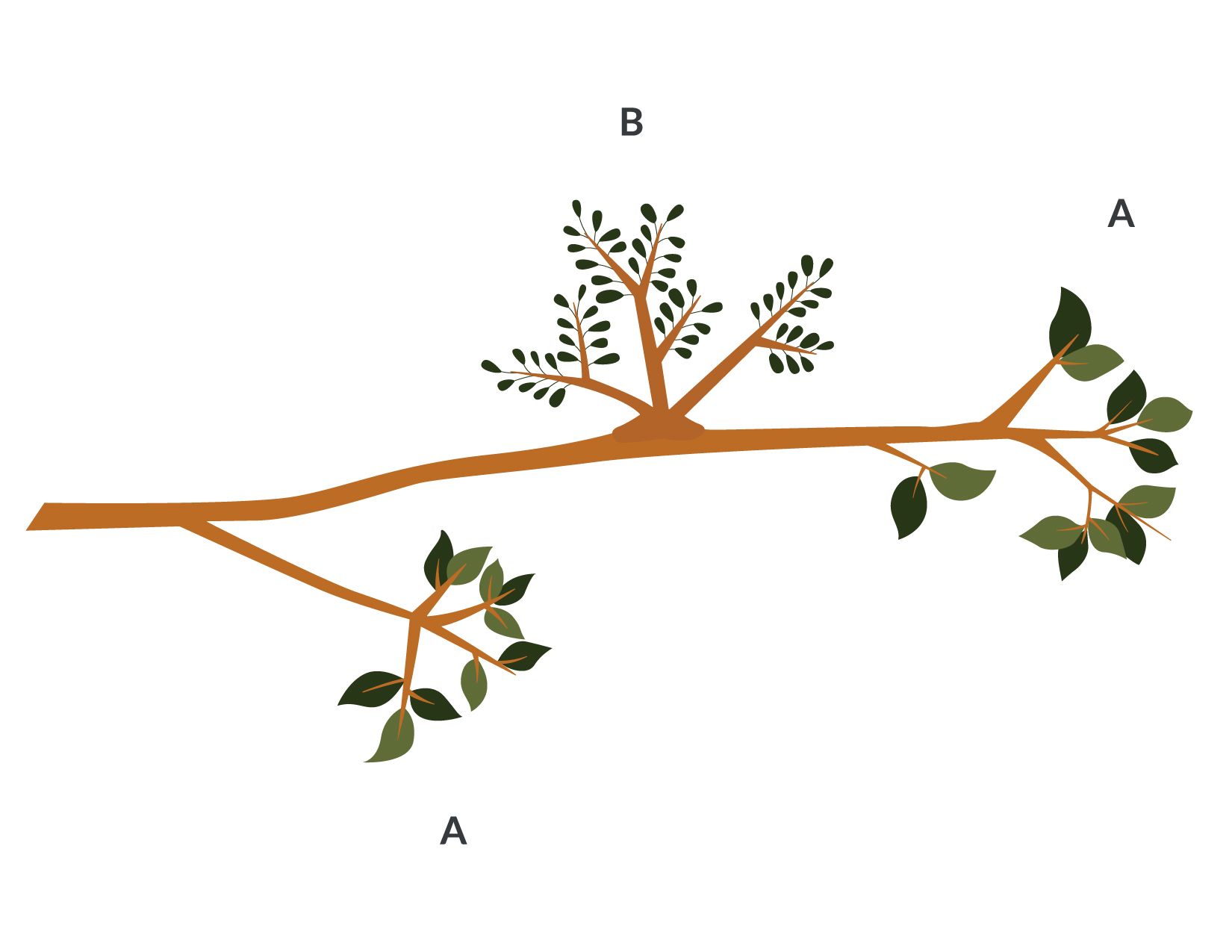
Parasitism
The average amount of municipal solid waste disposed of in a sanitary landfill is associated with which percentage?
55%
Which of the following trophic levels contains the LEAST amount of biomass?
Tertiary consumers
Which of the following has the largest area of old-growth forests in the United States?
Alaska
If the respiration of an estuary is 79,200 kcal / m^2 / yr , what is the gross primary productivity of the ecosystem in kcal / m^2 / yr ?
88,000
A wetland has recently been drained and filled and is now used for commercial purposes. Which of the following correctly states how this would affect the hydrologic cycle?
There would be a decrease in infiltration, an increase in runoff, and an increase in flooding
Which of the following terms best describes an organism's habitat as well as the role it plays in its environment through its interactions with biotic and abiotic factors?
Niche
What kind of ecological relationship does this describe?
Whale barnacles spend most of their lives attached to the flesh of various baleen whale species. One such species is the humpback whale. Some humpback whale individuals have been known to have up to 450 kg of barnacles attached to their bodies. Whale barnacles are filter feeders and will feed on the same plankton that their humpback whale hosts are hunting. The barnacles may increase drag as the whale swims, but otherwise the whale is not impacted by the barnacles’ presence.
Commensalism
Which of the following units is typically used to represent ecological productivity, measuring the rate at which biomass or energy is produced per unit area over a period of time?
kcal/m²/year
The highest salinity surface water would be expected in which climate zone?
Subtropical
Which of the following biomes has all of the following characteristics?
Warm temperatures year-round
Alternating dry and wet seasons
Ample grasses
Widely scattered clumps of trees that support herds of herbivores
Savana
Which of the following statements best supports the results from the study?
Six white-tailed deer and six sika deer were enclosed in a pasture for observation during an eight-year study in central Texas. White-tailed deer are a native species to central Texas, while sika deer are a nonnative species to central Texas. White-tailed deer feed on flowering plants and the tips of trees and shrubs but do not eat grass. Sika deer feed on flowering plants, the tips of trees and shrubs, and grass. All other grazing animals were kept out of the pasture during the study. The number of sika deer more than doubled after the eight years, while the population of white-tailed deer decreased by 50 percent.
The sika deer out competed the white-tailed deer in consuming flowering plants and shrubs.
Which of the following best describes an example of resource partitioning in an ecosystem?
Two different bird species feed from the same oak tree; one eats acorns, and the other eats insects in the bark.
Which of the following terrestrial biomes has the highest primary productivity per unit area?
Tropical rain forest
Which box represents a carbon sink that holds carbon compounds for the shortest period of time?
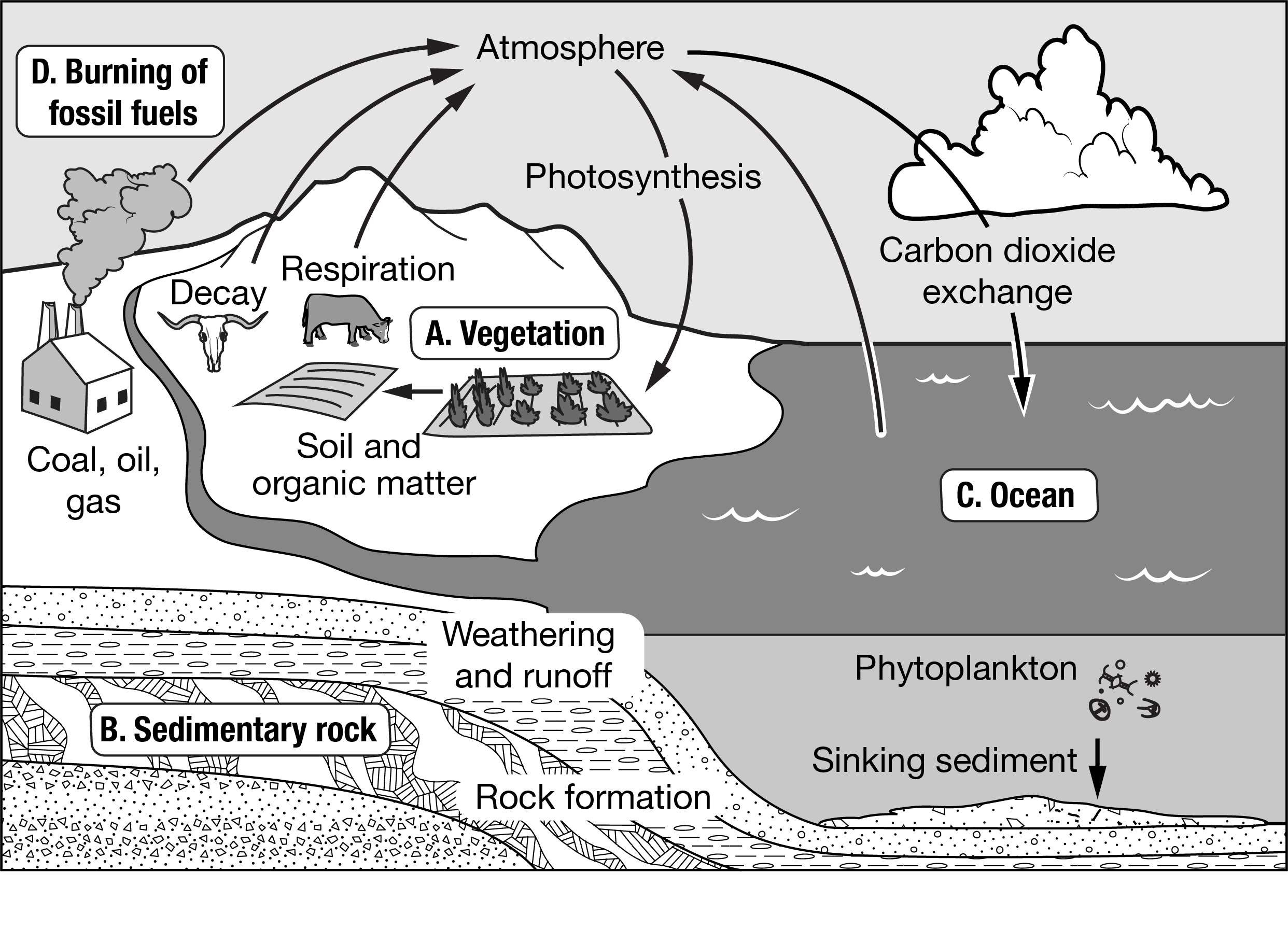
A
The diagram above best illustrates major processes in which of the following biochemical cycles?
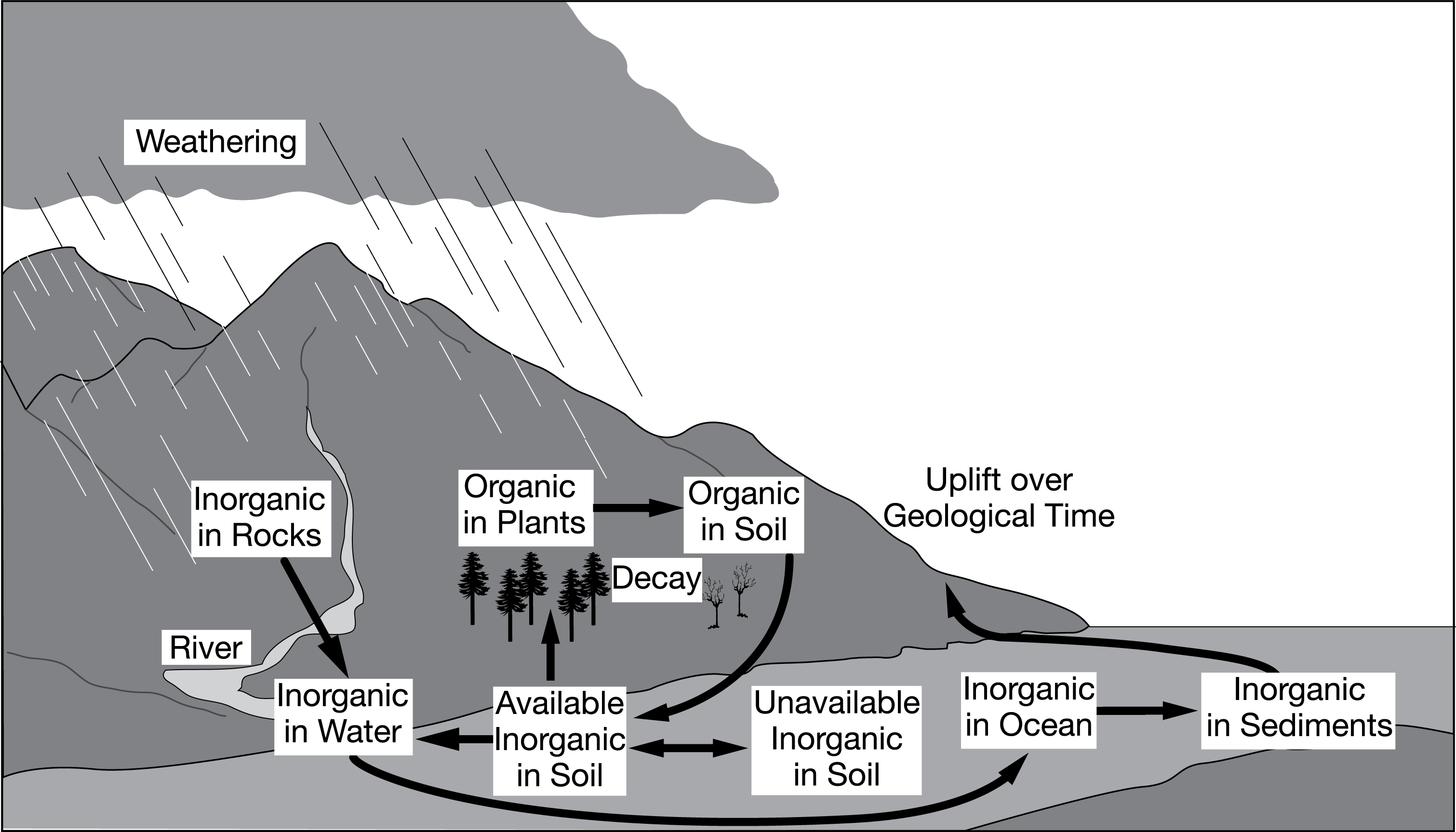
Phosphorus Cycle
Farmers in a suburban coastal town started using no-till agriculture, a practice that reduces soil erosion from their farmland. Use the image above to determine which of the following long-term effects no-till agriculture will have on the ecosystem surrounding the farmland.The total rate of photosynthesis in a given area.
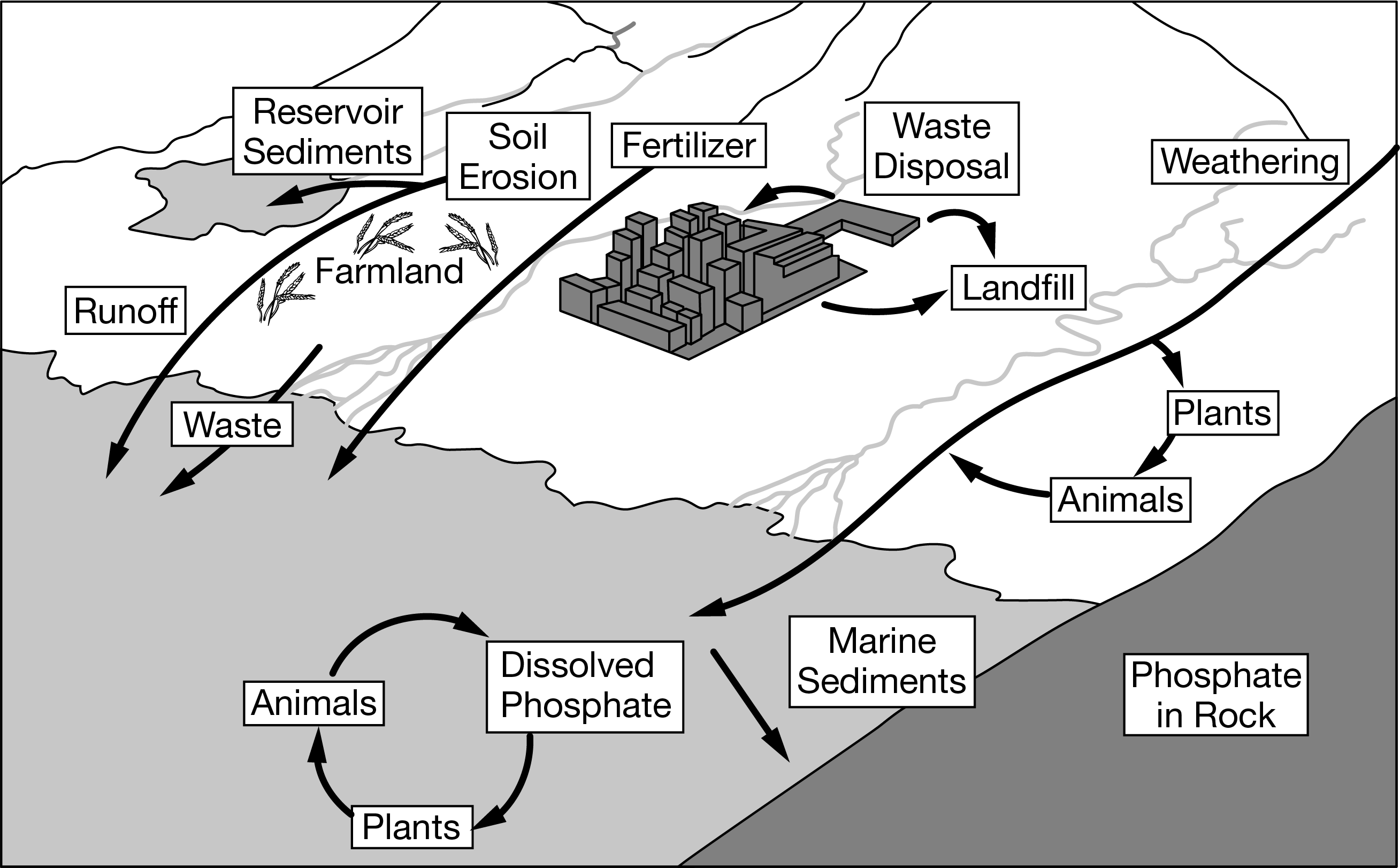
There will be less algal growth in the nearby ocean.
The total rate of photosynthesis in a given area.
Gross pri productivty
This rate of reaction can be measured in the dark by determining the amount of oxygen gas consumed in a period of time.
Cellular respiration
The energy available to consumers determined by subtracting the energy used by plants from the total energy transformed by the process of photosynthesis.
Net pri productivty
A temperate grassland biome has a gross primary productivity of 3,480 kcals/meter²/year and a net primary productivity of 2,000 kcals/meter²/year. Which of the following is the approx number of kcals/meter²/year avaible to herbivores in that biome?
2k kcals/meter²/year
Energy is transferred along food chains from one stage to the next. Which statement best explains how the energy is transferred?
If a primary producer stores 10,000 kcal of energy, then a tertiary consumer will have 10 kcal of energy available.
Which of the following is NOT an ecosystem service provided by wetlands?
Nutrient-rich soil for cropland
A forest ecosystem can provide many different types of ecosystem services. Which of the following would be a provisioning ecosystem service provided by a forest ecosystem?
Fuel for heat
Deforestation causes all of the following EXCEPT
increased sequestration of carbon dioxide
Which of the following describes an economic consequence of eutrophication in the local coastal waterway?
Loss of revenue for the local fisheries
All of the following are examples of ecosystem services EXCEPT
demographic transition
Ecosystem services are the goods and benefits people can obtain from ecosystems around them. There are four types: provisioning, regulating, cultural, and supporting. Use your knowledge of ecosystem services to answer the question below. A town is surrounded by hills and forests. During the rainy season, flooding and mudslides happen, but due to careful maintenance of the surrounding trees and other flora, damage is not as bad as it could be.
Flood control and preventing erosion of the soil falls under which category of ecosystem services?
Regulating
A pack of wolves travels across an ice bridge while hunting. The ice bridge melts before the group returns to the mainland and once it reforms the smaller pack can no longer successfully reproduce with the original pack.
Which of the following indicates what type of event has occurred?
Allopatric speciation
A herpetologist studies the effect of temperature, precipitation, water levels, and day length on the reproductive cycles of a freshwater turtle species.
At what level of the ecological hierarchy is this research conducted?
Population
Groups of individuals of the same species that can interbreed with one another and live in the same general area are BEST known as a
population
Which of the following is NOT true of biodiversity hotspots?
It has to have lost at least 70 percent of its original habitat
Which of the following BEST describes species richness?
It counts the number of species in an area
How does an ecosystem differ from a community?
A community has living things, but an ecosystem also includes abiotic factors
For many generations, the flowers in a meadow have been pollinated by a particular species of honeybee. One year, a new species of honeybee moves into the meadow. This new species pollinates the same flowers as the old species. Which description best predicts what would happen if a new species of honeybee moves into a meadow that was already occupied by a particular honeybee that pollinated the meadow?
The honeybees cannot occupy the same niche and, therefore, one species will find a new ecosystem with a niche it can occupy
Which of the following describes how phosphorus cycles throughout Earth?
Phosphorus does not undergo significant changes like many other nutrients
Which of the following correctly identifies the main function of photosynthesis?
Converts solar energy to chemical energy
If a terrestrial ecosystem has a gross primary production of 4,500 kcal/m2/yr and a cellular respiration rate of 2,500 kcal/m2/yr, what is the net primary production for this ecosystem?
2,000 kcal/m2/yr
Which best describes the role of a primary consumer in a food web?
Herbivore that feeds on producers
Some individuals in a population have genetic traits that enhance their ability to survive and produce offspring and are therefore favored by their environment. This phenomenon is known as
Natural selection
Which BEST defines the term divergent evolution? Elimination Tool Hide eliminated answers Select one answer
The accumulation of differences between groups of the same species which leads to the formation of new species
Over time, hummingbirds and bird-pollinated flowers have developed a mutualistic relationship. The flowers' color suits the birds' vision, their nectar is suited to the birds' diet and their unique flower shapes fit the bills of distinct hummingbird species. The bloom times of the flowers also coincide with hummingbirds' breeding seasons. This is an example of
Coevolution
Which of the following is an example of a regulating ecosystem service?
A rainforest utilizing carbon dioxide
A large section of public forest to a logging company, which ecosystem service would a local bird watching group be most concerned with?
Cultural
Which of the following events is most likely to result in conditions suitable for primary succession?
A glacial retreat
Which statement best describes the difference between primary and secondary succession?
In primary succession, there is a progression of growth that develops on newly-formed land, whereas in secondary succession, it is the redevelopment of a habitat that has been disturbed by an event.